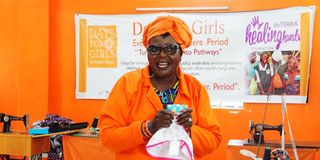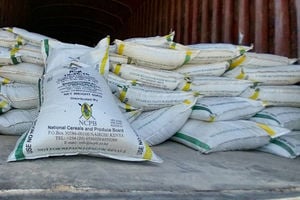Why I decided to make reusable sanitary towels for rural girls

Khayange Wasike, the director and founder Lugari Community Centre.
What you need to know:
- Khayanga Wasike notes that she was driven by her period poverty experience.
- Today, she has fashioned herself as a menstrual hygiene champion.
Growing up, Khayanga Wasike, like most girls during her time, struggled to access sanitary towels and had to use any material available to keep herself clean, sometimes “even using cow dung”.
Since then, the situation has not changed much in many rural settings and Khayanga understands this all too well.
In 2017, she decided not to sit back and watch as many girls face the predicament. She set up the Days for Girls Lugari, a non-profit organisation that provides reusable sanitary towels and empowers rural girls, especially in western Kenya.
Khayanga notes that she was driven by period poverty experience. Today, she has fashioned herself as a menstrual hygiene champion.
“I used the dry dung because there was nothing better and later used dry banana leaves. My mother was poor and I could not tell that I needed the special towels,” she explains.
Five years ago, she fundraised to buy towels for girls in a local school and was shocked that most of them failed to access the necessity. This inspired her decision to set up a small factory to make reusable towels for the local community.
Khayanga explains that the reusable towel is made of cotton with a protective shield, underwear and a liner. It offers comfort and is more durable and affordable, thus more sustainable than those in the market, she adds.
“It's not just the pads but the packaging and materials used to manufacture them. Disposable pads have a large carbon footprint and are made with non-recycled plastics and other synthetic components. Switching to reusable pads greatly decreases your environmental impact,” she says, adding that other benefits include comfort, cost, convenience, cleanliness, eco-friendliness and economic gain for those sewing them.

A staff member explains how a reusable sanitary towel works at the Lugari Community Centre that champions Days for Girls sanitary pads drive.
Between 2017 and 2019, they used to stitch up to 100 a month, but now they make up to 1,000 a month depending on the orders. The prices also vary.
“For instance, the Starter Kit with two shields, four liners, one innerwear, transport bag, care and usage paper goes for Sh600, while Supreme Kit it with two shields, eight liners, two innerwear, one transport bag, one washcloth, one drawstring bag, soap and care and reusable paper goes for Sh1,000.”
Khayanga has employed eight workers, six sewers and two packagers. She, however, expresses concern that many girls from poor backgrounds had dropped out of school for lack of the essential commodity while others engaged in social vices to access the towels.
“There are still assumptions that the pads are difficult to clean and stigma towards reusable pads. We also have the assumption that they are only for girls from poor families but we are sensitising the public to its benefits,” says the mother of 14, two biological and 12 adopted.
So far, more than 10,000 girls have benefitted. They are from Kakamega, Uasin Gishu, Bungoma, Vihiga, Busia, Nakuru and Kisumu counties.
She plans to expand outreach.
“Our ultimate goal is to encourage widespread adoption of reusable pads and challenge the reliance on disposable options that pose environmental and financial burdens,” she observes.
She explains that the government had created a proper policy framework to support the project. For instance, in January 2021, the Kenya Bureau of Standards (Kebs) announced a forthcoming product standard for reusable pads. The standard is now in place.
Beneficiaries say the initiative has been a game changer as more girls can access this crucial commodity. Irene Ludenyu says the towels have eased the financial burden she faced. She says one requires at least three towels but the disposable ones are out of reach for many girls.
“I used to miss school, which affected my performance. This programme has enabled me to attend classes and improved my performance as I no longer have to worry about where I can get it,” she says.
Alex Munmamnu, a father, expresses his support for the initiative, acknowledging the affordability and positive impact on his daughters’ well-being. “I want to encourage other fathers to follow suit and ensure their daughters have access to these essential hygiene products.”





